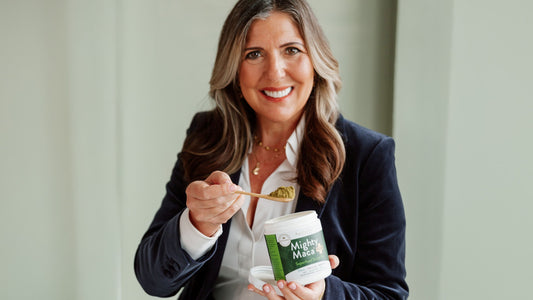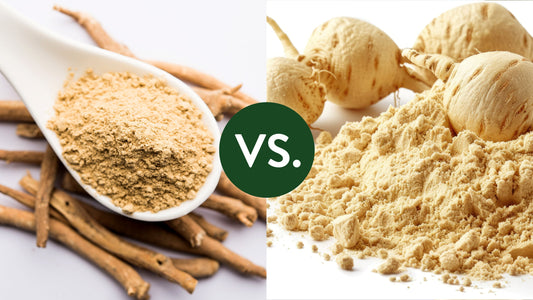The earliest signs of menopause can start to appear well before you’re ready. For some women, they can show up as early as age 35. But when you know the subtle signs to look for, you can create a battle plan that puts a stop to them before they take hold.
You have so much power over how your menopause story gets written.
So let’s look at the earliest signs of menopause, which include vaginal dryness, missed periods, sleep troubles, weight gain, headaches, and insulin resistance. I’ll show you why these symptoms crop up and how you can mitigate the effect they have on your life by getting to the root of the problem.
What Are Early Signs Of Menopause?
So what are the first signs of menopause? How do you know when menopause starts? I get this question all the time from younger women looking to prepare themselves and women who are wondering if the subtle symptoms they’ve been experiencing point to menopause as the culprit.
Here are some of the early signs of menopause:
- Changes to your cycle (it could become more or less frequent, heavier, lighter, shorter or longer at first)
- You’re gaining a bit of weight but you’re not really sure why
- You feel bloated, achy, and tired all the time — and yet, you have more trouble sleeping than you used to
- You may even have hot flashes, night sweats, high blood pressure, high blood sugar, or high cholesterol
As you can see, these first signs of menopause might not be anything to cause alarm. You might not even think to mention it to your doctor if your period one month is 6 days long and the next month it only lasts 4 days.
But here’s the thing, girlfriend. Once you start to see these small, subtle changes, they won’t just disappear on their own. Your hormone levels will only keep declining as you age and your ovaries stop ovulating and cycling. Which means your symptoms will only continue to worsen if you don’t work on actively supporting your body through this transition.
And — it’s important to note that you may even see these signs of early menopause in your 30s.
Premature Menopause Signs
For the purposes of this article, when I say “early menopause” I mean early symptoms of normal menopause, not primary ovarian insufficiency, which is sometimes used interchangeably with the term early menopause which is also confused with the term premature menopause. (1)
If you hit menopause (the one-year anniversary of not having a period) at age 45 or older, that is considered ‘normal,’ but the average age for menopause is 51. If you experience menopause before age 45, it could be a result of primary ovarian insufficiency or premature menopause, or the result of having a hysterectomy.
What Causes Menopause Symptoms?
Menopause can seriously affect your quality of life, that much we know for sure. But why? What causes menopause symptoms? There are a few reasons, which I’ll talk about in more detail below — but a few of the main causes of menopause symptoms are:
- Dropping sex hormone levels, especially progesterone, estrogen, and testosterone
- Inflammation
- Cortisol dysregulation
- Insulin resistance
- Low magnesium levels
Low Estrogen In Menopause Symptoms
First, let’s talk about how low estrogen in menopause can cause those early signs of menopause.
Declining estrogen levels are one of the ways you know your body is entering its ‘menopause era.’ And it’s that lowered estrogen that’s to blame for many of the classic menopausal symptoms, like hot flashes, low libido, mood changes, fatigue, and vaginal atrophy.
There are estrogen receptors all over your body, and some women also experience low estrogen joint pain in menopause, too.
One of the earliest signs of menopause (and one of the most unwelcome) caused by lowered estrogen is vaginal dryness. Vaginal dryness in perimenopause and menopause is extremely common. Because your vagina and vulva rely on estrogen to stay juicy and moist, when estrogen starts to disappear — so does the moisture and plumpness of your tissues down there.
When estrogen is low, it’s important to naturally support your body’s production of this crucial hormone. You can do this by making sure you’re eating a variety of vitamin and mineral-packed foods, as well as supplementing with Dehydroepiandrosterone (DHEA) — your body’s precursor to estrogen.
What Happens When Progesterone Levels Are Low
Just as your estrogen starts to wane when menopause begins, so does your progesterone. During your more fertile years, your body produces most of its progesterone after you ovulate. (2)
Progesterone is a natural calming force in your body. Progesterone serves as a balancing presence to estrogen. (3)
And as you start ovulating less frequently, that monthly boost of progesterone your body has come to expect doesn’t arrive. Hence, you can experience a whole range of uncomfortable symptoms. Things get worse when your progesterone drops so low it can’t keep estrogen in check. This results in a situation known as estrogen dominance, and yes, even women in perimenopause and menopause can experience it.
Signs your progesterone is low include:
- Headaches and migraines
- Mood changes like anxiety and depression
- Sleep troubles
- Weight gain
When progesterone is low, it’s important to make sure that your diet includes a wide variety of plant foods that include healthy fats, magnesium, and vitamins. Your body needs all of these nutrients to make progesterone.
It’s also important to support your adrenals during this time. Your adrenals are like a backup generator for your sex hormones. When your ovaries aren’t producing to their fullest capacity, your adrenals can step in and lend a little helping hand that can make a huge difference in how you feel.
Adrenal Health And Balance
While we’re on the subject, let’s talk a little more in-depth about your adrenals and how they impact your earliest menopause symptoms.
For one, as I mentioned above, your adrenals can step in and give you a little boost in the hormone-producing department…but that’s only if they’re not busy pumping out cortisol.
If you’re under stress due to your job or your family responsibilities…that can make your adrenals forget their helpful directive to produce sex hormones and simply dump cortisol (the stress hormone) into your body. That in turn leads to that classic menopause cortisol weight gain around your midsection.
It’s not just stress from external sources that causes your cortisol levels to rise, either. Your body can signal your adrenals to produce cortisol if it senses any sort of stress. (4) Examples of stress could include lowered levels of sex hormones, or too much or too little exercise.
Increased cortisol could also amplify the symptoms of low progesterone and low estrogen, like hot flashes and depression. (5,6)
What’s more, cortisol plays an important role in blood sugar regulation. So when your cortisol levels are high, it can contribute to insulin resistance, a situation that leads to weight gain and, if left unchecked, diabetes.
This is why it’s so important to keep your adrenals happy and your menopause cortisol levels under control.
Insulin Resistance And Menopause
Another of the earliest menopause signs could be trouble with your blood sugar. As we explored above, your adrenal health and cortisol can be a factor here.
But your diet and exercise are crucial for maintaining insulin sensitivity too.
How do you know if you’re veering into insulin-resistance territory? That’s one of the challenging parts of this equation. The signs are often subtle until things are nearly out of control. And unless you get a specific test from your doctor (and a lot of doctors aren’t necessarily testing for your fasting insulin or A1C levels) you may not realize you’ve developed insulin resistance until it’s too late.
This is one of the reasons I always encourage the addition of fiber to your diet. Fiber can help your body manage blood sugar and also helps you lose weight, which in turn improves your insulin sensitivity. It really is a nutritional powerhouse and it also helps you feel fuller, longer.
Inflammation In Menopause
Researchers are starting to believe that when your estrogen levels drop in menopause, that it leads to an increase in inflammation in your body. (7)
Inflammation is a driver of disease and is associated with increased risk for just about every disease known to mankind.
This is why it’s important to watch what you eat and try to consume as many anti-inflammatory compounds as you possibly can, like turmeric, flax, and antioxidants found in vegetables.
Low Magnesium And Menopause
Magnesium is crucial for more than 300+ functions in your body. And one of those crucial biochemical reactions is the support of hormone production. Your body cannot produce estrogen, progesterone, or testosterone without magnesium — and a lot of women aren’t getting enough of it.
Magnesium is found in foods like spinach, which is why I included plenty of that leafy green goodness in my Menopause Kit.
Stopping The Earliest Signs Of Menopause In Their Tracks
While it may seem like you’ve got to manage so much when it comes to beating those early signs of menopause, I’ve made things a little bit easier for you.
I’ve bundled together my top 3 menopause management tools into a Menopause Kit so you can get everything under control simply.
It includes everything you need to support your menopausal body from every single possible angle.
The Menopause Kit combines:
- Julva®, my patented vulva revitalizing cream for a near-instant boost to your love life and your estrogen-starved tissues down there, thanks to DHEA and a silky-smooth formula that packs on the moisture and lubrication.
- Balance cream, a luxurious delivery system for progesterone and pregnenolone that doubles as a face cream — for the ultimate in hormone support, convenience, and radiant skin.
- Mighty Maca® Menopause Capsules, which are packed with vital nutrients your body needs to make hormones, fiber, and top-shelf adrenal support that’s so effective, you might just forget you’re going through “the change.” Mighty Maca® Menopause Capsules also contain ingredients that support healthy levels of inflammation. They really are the total package when it comes to menopause support.
This kit makes it so simple to support your body naturally, in every possible way. If you’ve noticed a few of the earliest signs of menopause cropping up, now is the time to stop them in their tracks *before* they get worse.
Learn more about the Menopause Kit here.
References
- https://www.ncbi.nlm.nih.gov/pmc/articles/PMC3634232/
- https://www.ncbi.nlm.nih.gov/books/NBK441996/
- https://www.ncbi.nlm.nih.gov/books/NBK558960/
- https://www.ncbi.nlm.nih.gov/pmc/articles/PMC2749064/
- https://www.ncbi.nlm.nih.gov/pmc/articles/PMC9285862/
- https://www.ncbi.nlm.nih.gov/pmc/articles/PMC4513660
- https://jneuroinflammation.biomedcentral.com/articles/10.1186/s12974-020-01998-9



